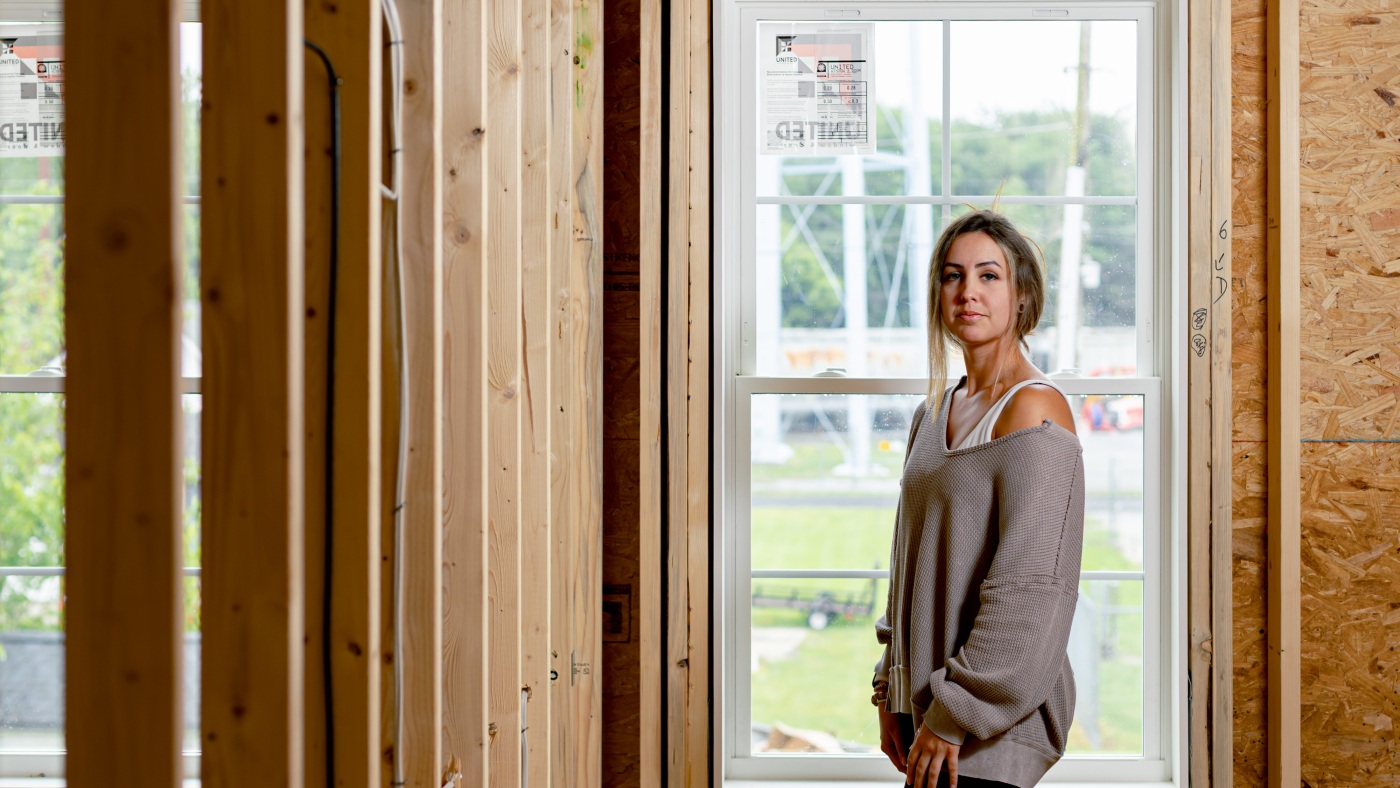Becca Morris in the home she’s in the process of buying in Harrington, Delaware, on May 14, 2026. She found it just a few months before her federal housing subsidy was set to end.
Wesley LaPointe/for NPR
hide caption
toggle caption
Wesley LaPointe/for NPR
When Becca Morris applied for a federal housing subsidy years ago, her life was in turmoil. She’d had a son at age 19, the father was in and out of rehab and prison, and she was couch surfing with friends and family.
Morris wasn’t fazed when the offer of rental aid came with a major condition: That money would end after seven years, max. “I feel like this was … good pressure,” she says. A push to do better and go back to school and “to do what I need to do.”
Thanks to that subsidy, she and her son live in a small two-bedroom home in Bridgeville, Del. Blue light dances on the ceiling from two large aquariums, there are plants everywhere, and photos of her now 13-year old adorn the fridge. It is cozy but cramped, and Morris is eager for more space.
And that seven-year cutoff? It’s actually come and gone, partly because of the COVID pandemic. But it turns out this program is about a lot more than a ticking time limit.

The house on the right is where Becca Morris and her son live in Bridgeville, Del. The state has one of the few housing authorities in the country with the power to impose a time limit and work requirement in exchange for a housing subsidy.
Wesley LaPointe/for NPR
hide caption
toggle caption
Wesley LaPointe/for NPR
Only a small number of local housing authorities currently have the power to impose things like a time limit, if they choose. The Delaware State Housing Authority, which serves two counties in the state, is one of them. But the Department of Housing and Urban Development is working on a rule to vastly expand that power, not only for time limits, but also work requirements, according to an internal document seen by NPR.
HUD declined to confirm the plan or provide details. But an agency spokeswoman noted that President Trump’s budget proposal included a two-year time limit for rental aid and said it would help people “achieve self-sufficiency and economic independence.”
Housing policy experts say there’s little evidence that time limits or work requirements boost employment or help people move off subsidies. And they worry many people could face harsh consequences at a time when rent prices remain out of reach for a large share of Americans.
There’s a lot more to this program than a time limit

Becca Morris, in her living room, calls the time limit on her housing subsidy “good pressure.”
Wesley LaPointe/for NPR
hide caption
toggle caption
Wesley LaPointe/for NPR
The “good pressure” Morris says she felt from the Delaware program included a requirement to work. Those who are elderly or disabled are exempt, but otherwise it applies to every adult member of a household unless they’re in school or training. There were also regular meetings to make sure she was on track financially. Plus — and this is key — the Delaware State Housing Authority helped Morris save money.
For most people with housing subsidies, if their income goes up their rent does, too. But not with the Delaware program. Monthly payments stay flat, so people can save over time. And the extra money they would have paid toward rent goes into an interest-bearing savings account, which they can access when they leave.
Morris says she never could have done that on her own. “I would have been literally paycheck to paycheck this entire time. How would I have saved any money without having to work like seven days a week, 24 hours?” she says.

Photos of family members, including Becca Morris’ son, Jayden, decorate a bulletin board in her bedroom.
Wesley LaPointe/for NPR
hide caption
toggle caption
Wesley LaPointe/for NPR
There’s also a two-tiered time limit. If people are able to move on within five years, they get all the money in their savings account. If not, there’s a two-year buffer that comes with a penalty. Morris needed that extra time, so she’ll only get part of her savings. But she feels it still makes sense financially. “I was able to save more staying here with the lower rent,” she says.
And there was more wiggle room with her deadline. In addition to getting an extra year because of the pandemic, she was granted extra time after she injured her wrist and couldn’t work for a while. She’s also grateful she got a break on rent — paying just $50 — when she had to stop working for more than a year so she could finish up a nursing degree.

The kitchen in Becca Morris’ home. She was able to stop working for more than a year — and get a break on her rent — to complete a nursing degree.
Wesley LaPointe/for NPR
hide caption
toggle caption
Wesley LaPointe/for NPR
Now, after nine years living here, Morris and her son are finally getting ready to move out. “Yes, the stars align to the grace of God,” she says, “everything worked out perfectly.”
Time limits have not worked out well everywhere
Only a quarter of people who qualify for rental assistance are able to get it, and that’s a driving factor for supporters of time limits.
“Once you get a housing subsidy, it’s for life. So as a result of that, there are extremely long waiting lists,” says Howard Husock, a senior fellow in domestic policy at the conservative-leaning American Enterprise Institute.
The median length of stay on federal housing assistance is around four to five years, according to one recent study, though Husock says many people stay more than a decade.
“The system is kind of all backed up and so that’s the logic of a time limit,” he says. “Not to punish people, but to encourage turnover, encourage upward mobility and to make way for people who are in need who are not being served.”

A water tower stands above downtown Bridgeville, Del. A number of other local housing authorities have ended time limits, after finding that renters’ incomes didn’t increase enough to afford market-rate housing.
Wesley LaPointe/for NPR
hide caption
toggle caption
Wesley LaPointe/for NPR
But time limits have not worked out well everywhere.
In Washington state, the Tacoma Housing Authority imposed a five-year maximum back in 2013. Then, even those with decent jobs struggled as rents started skyrocketing.
“People are working, they’re working really hard. They’re just not able to get ahead because housing is so expensive compared to what they’re being paid,” says April Black, the housing authority’s executive director.
She says it was impossible for people to save money, and as the five-year deadlines came due, there was heartburn about cutting people off. “We’re here to house people, and there was no way that we were going to exit people from a program knowing that they would become homeless,” Black says.
Tacoma did its own analysis and found that people with a regular housing voucher, and no time limit, actually fared better at increasing their incomes and moving on. They ended the time limit in 2022.
The reason for success “is not because there’s a time limit”

Morris’ street in Bridgeville. The head of the Delaware State Housing Authority says a time limit gives renters a sense of urgency but an automatic savings plan and other support is what really helps them get ahead and move on.
Wesley LaPointe/for NPR
hide caption
toggle caption
Wesley LaPointe/for NPR
At the Delaware State Housing Authority, Director Matthew Heckles agrees that the severe lack of affordable housing complicates the case for time limits. He also echoes others who say the two-year time limit in Trump’s budget proposal isn’t at all realistic. “I don’t think we have very many, if any, families that … graduate after two years,” he says.
But given the success he’s seen in Delaware, Heckles still thinks it makes sense to try and scale time limits nationally.
“I think it comes with a big caveat, though. The reason that people are successful is not because there’s a time limit,” he says.
Yes, it adds urgency. But what really makes the difference are the interest-bearing savings accounts, he says, which grow to about $7,000 on average, plus all the other extra support.
That can be in the form of help with budgeting or with finding child care or health insurance. Once, when a lot of tenants worked at the same place, “we ran a bus essentially from point A to point B so people could get to work,” he says.
After moving on, Heckles says many people still need other kinds of low-income housing. But others do make it without subsidies, and some have even been able to buy their own place.
A home of their own, with laundry and everything

Becca Morris stands on the front porch of her future home, in Harrington, Delaware.
Wesley LaPointe/for NPR
hide caption
toggle caption
Wesley LaPointe/for NPR
That includes Becca Morris, who drives to a nearby town and parks in the muddy backyard of a two-story house under construction.
“Well, here we are, my new home!” she says.
Morris looked for a place for two years, thinking older houses would be cheaper, but she kept getting outbid. It was nerve-wracking, with just a few months before her deadline. Then she found this place, already being built but not yet sold.
She walks by wood stud walls as she points out the rooms. “I cannot wait to do laundry in my own house,” she says at the top of the stairs. “And that sounds crazy, but I am super thrilled about that.”
Morris knows it will be tight, and she’ll have to work more to pay the mortgage. She’s confident she can make it work, but says it still feels overwhelming.
“Come moving in is when it’ll really, like, hit me,” she says. “Wow, I did this.”












Leave a Reply